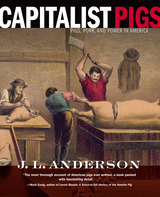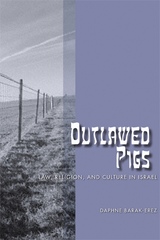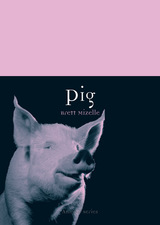
Pigs are everywhere in United States history. They cleared frontiers and built cities (notably Cincinnati, once known as Porkopolis), served as an early form of welfare, and were at the center of two nineteenth-century “pig wars.” American pork fed the hemisphere; lard literally greased the wheels of capitalism.
J. L. Anderson has written an ambitious history of pigs and pig products from the Columbian exchange to the present, emphasizing critical stories of production, consumption, and waste in American history. He examines different cultural assumptions about pigs to provide a window into the nation’s regional, racial, and class fault lines, and maps where pigs are (and are not) to reveal a deep history of the American landscape. A contribution to American history, food studies, agricultural history, and animal studies, Capitalist Pigs is an accessible, deeply researched, and often surprising portrait of one of the planet’s most consequential interspecies relationships.

Daphne Barak-Erez specifically traces the course of two laws, one that authorized municipalities to ban the possession and trading in pork within their jurisdiction and another law that forbids pig breeding throughout Israel, except for areas populated mainly by Christians. Her analysis offers a comprehensive, decade-by-decade discussion of the overall relationship between law and culture since the inception of the Israeli nation-state.
By examining ever-fluctuating Israeli popular opinion on Israel's two laws outlawing the trade and possession of pigs, Barak-Erez finds an interesting and accessible way to explore the complex interplay of law, religion, and culture in modern Israel, and more specifically a microcosm for the larger question of which lies more at the foundation of Israeli state law: religion or cultural tradition.

Known as much for their pink curly tails and pudgy snouts as their low-brow choice of diet and habitat, pigs are prevalent in popular culture—from the Three Little Pigs to Miss Piggy to Babe. Today there are more than one billion pigs on the planet, and there are countless representations of pigs and piggishness throughout the world’s cultures.
In Pig, Brett Mizelle provides a richly illustrated and compelling look at the long, complicated relationship between humans and these highly intelligent, sociable animals. Mizelle traces the natural and cultural history of the pig, focusing on the contradictions between our imaginative representation of pigs and the real-world truth of the ways in which pigs are prized for their meat, used as subjects in medical research, and killed in order to make hundreds of consumer products. Pig begins with the evolution of the suidae, animals that were domesticated in multiple regions 9,000 years ago, and points toward a future where pigs and humans are even more closely intertwined as a result of biomedical breakthroughs. Pig both examines the widespread art, entertainment, and literature that imagines human kinship with pigs and the development of modern industrial pork production.
In charting how humans have shaped the pig and how the pig has shaped us, Mizelle focuses on the unresolved contradictions between the fiction and the reality of our relations with pigs.

Josh’s big story is that a corporation that plans to establish an enormous hog farm has bought a lot of land along the Tamarack River in bucolic Ames County. Some of the local residents and officials are excited about the jobs and tax revenues that the big farm will bring, while others worry about truck traffic, porcine aromas, and manure runoff polluting the river. And how would the arrival of a large agribusiness affect life and traditions in this tightly knit rural community of family farmers? Josh strives to provide impartial agricultural reporting, even as his newspaper is replaced by a new Internet-only version owned by a former New York investment banker. And it seems that there may be another force in play: the vengeful ghost of a drowned logger who locals say haunts the valley of the Tamarack River.
READERS
Browse our collection.
PUBLISHERS
See BiblioVault's publisher services.
STUDENT SERVICES
Files for college accessibility offices.
UChicago Accessibility Resources
home | accessibility | search | about | contact us
BiblioVault ® 2001 - 2024
The University of Chicago Press









